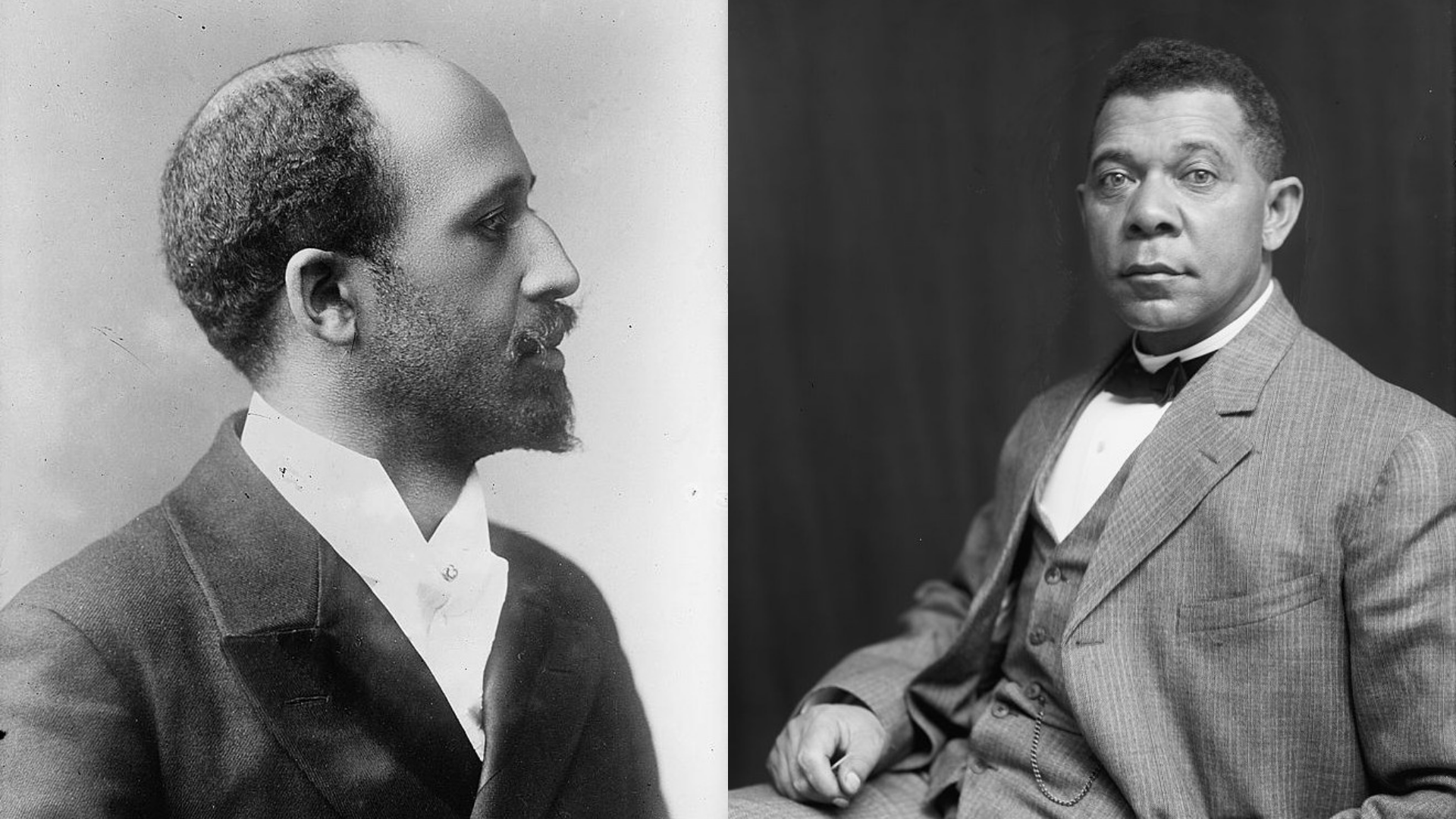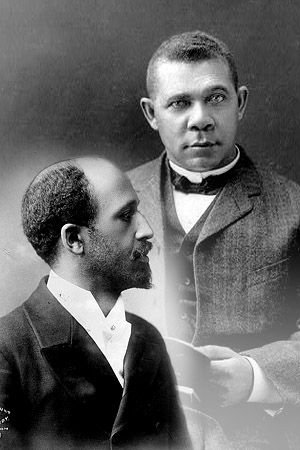Celebrating the Leadership of W.E.B. Du Bois and Booker T. Washington
February 13th, 2024
Booker T. Washington and W.E.B. Du Bois were two prominent African American leaders in the late 19th and early 20th centuries, each advocating for the empowerment of the African American community, albeit through different ideologies. Their work is integral to understanding the landscape of their time and the enduring legacy they left behind.

With the end of the Civil War, America entered a period of Reconstruction (1863-1877). It was a time of reconciliation and rebuilding. African Americans throughout the South flooded into schoolhouses to gain an education and exercised their right to vote, electing officials to county offices, state houses, and Congress. This period of healing would not last long. Although slavery was no longer legal and Congress passed the 13th, 14th, and 15th Amendments, giving African Americans the right to be free, the right to vote, and equal protection under the law, segregation and disenfranchisement were still the order of the day. Jim Crow laws, with the support of Plessy vs. Fergusson in 1898, drove a wedge in the heart of America, segregating African Americans and Whites. Literacy tests and poll taxes effectively removed the ballot from the Black community. With the end of Reconstruction, the Ku Klux Klan was formed, and violence, intimidation, and racism spread throughout the South. Both Du Bois and Washington emerged to tackle these issues and provide leadership and vision to the Black community and America.
Booker T. Washington Born into slavery in Hale’s Ford, Virginia, Washington emerged as a leading figure in the post-Reconstruction era. At nine, Booker T. and his family were freed from slavery by the signing of the Emancipation Proclamation. In 1895, he delivered his famous Atlanta Compromise speech, urging African Americans to focus on vocational and industrial education to achieve economic self-sufficiency. Washington believed that by acquiring practical skills and economic status, Black individuals could gradually overcome racial prejudice. His philosophy emphasized patience, hard work, and accommodation, advocating for a gradual and non-confrontational approach to civil rights.
Born into slavery in Hale’s Ford, Virginia, Washington emerged as a leading figure in the post-Reconstruction era. At nine, Booker T. and his family were freed from slavery by the signing of the Emancipation Proclamation. In 1895, he delivered his famous Atlanta Compromise speech, urging African Americans to focus on vocational and industrial education to achieve economic self-sufficiency. Washington believed that by acquiring practical skills and economic status, Black individuals could gradually overcome racial prejudice. His philosophy emphasized patience, hard work, and accommodation, advocating for a gradual and non-confrontational approach to civil rights.
Washington founded Tuskegee Institute, now Tuskegee University, in 1881. Tuskegee became a model for schools across the South. Students would learn a trade that would give them a job and a way to move forward. Washington’s students served all roles at Tuskegee. In addition to their education, they built buildings, farmed, and took care of the everyday needs of the school. Under Washington’s leadership, education in the South flourished.
 Washington was critical of W.E.B. Du Bois and his focus on higher education and direct action. To Washington, a Ph.D. in poetry would limit one to being a doorman on the upper West side of New York City or a porter on a train from Washington D.C. to Philadelphia. Although Washington was not a fan of challenging segregation and disenfranchisement head-on, he was secretly pleased with court challenges that would upset the status quo. Washington believed that direct action would lead to more violence. His focus was on economic power as a means to confront racial injustice in America.
Washington was critical of W.E.B. Du Bois and his focus on higher education and direct action. To Washington, a Ph.D. in poetry would limit one to being a doorman on the upper West side of New York City or a porter on a train from Washington D.C. to Philadelphia. Although Washington was not a fan of challenging segregation and disenfranchisement head-on, he was secretly pleased with court challenges that would upset the status quo. Washington believed that direct action would lead to more violence. His focus was on economic power as a means to confront racial injustice in America.
In 1901, Washington published his autobiography Up From Slavery. Later that year, he had dinner with President Theodore Roosevelt. He was the first African American to meet publicly with a president. Washington writes about his childhood:
I cannot remember a single instance during my childhood or early boyhood when our entire family sat down at the table together, and God's blessing was asked, and the family ate a meal in a civilized manner. On the plantation in Virginia, and even later, meals were gotten to the children very much as dumb animals get theirs. It was a piece of bread here and a scrap of meat there. It was a cup of milk at one time and some potatoes at another.
W.E.B. Du Bois William Edward Burghardt (W.E.B.) Du Bois was born in 1868 in Great Barrington, Massachusetts. He grew up in a more tolerant and integrated community. Du Bois studied sociology in Berlin and was the first African American to earn his doctorate from Harvard. Du Bois, a scholar and civil rights activist, challenged Washington's ideas. He argued for higher education and the "Talented Tenth" – a group of educated elites who would lead the Black community to full civil and political rights. Unlike Washington, Du Bois believed in immediate civil rights activism, pushing against racial segregation and disenfranchisement. His influential work, The Souls of Black Folk, critiqued Washington's approach, advocating for the importance of political and intellectual rights alongside economic advancement. Du Bois was a prolific author, penning works like Black Reconstruction in America and Dusk of Dawn, his autobiography. He also edited the NAACP’s publication, The Crisis, and published articles in The Atlantic.
William Edward Burghardt (W.E.B.) Du Bois was born in 1868 in Great Barrington, Massachusetts. He grew up in a more tolerant and integrated community. Du Bois studied sociology in Berlin and was the first African American to earn his doctorate from Harvard. Du Bois, a scholar and civil rights activist, challenged Washington's ideas. He argued for higher education and the "Talented Tenth" – a group of educated elites who would lead the Black community to full civil and political rights. Unlike Washington, Du Bois believed in immediate civil rights activism, pushing against racial segregation and disenfranchisement. His influential work, The Souls of Black Folk, critiqued Washington's approach, advocating for the importance of political and intellectual rights alongside economic advancement. Du Bois was a prolific author, penning works like Black Reconstruction in America and Dusk of Dawn, his autobiography. He also edited the NAACP’s publication, The Crisis, and published articles in The Atlantic.
Du Bois and his colleagues formed the Niagra Movement as a vehicle for the advancement of equal rights. The group was opposed to Washington’s Atlanta Compromise speech. Du Bois was a founder of the National Association for the Advancement of Colored People (NAACP). The NAACP confronted segregation in the courts, taking legal action to chip away at legalized segregation embedded in American life with Plessay vs. Fergusson, 1898. Through the efforts of the NAACP, segregation slowly eroded, paving the way for the landmark Supreme Court decision of Brown vs. Board of Education of Topeka, Kansas, in 1954 and the explosion of the Civil Rights Movement in the 1950s and 1960s.
 The dichotomy between Washington and Du Bois encapsulates the broader debates within the African American community at the time, known as the "Washington-Du Bois debate." Washington's accommodationist stance was seen by some as pragmatic and realistic, while Du Bois's militant advocacy for equal rights resonated with those who sought immediate change.
The dichotomy between Washington and Du Bois encapsulates the broader debates within the African American community at the time, known as the "Washington-Du Bois debate." Washington's accommodationist stance was seen by some as pragmatic and realistic, while Du Bois's militant advocacy for equal rights resonated with those who sought immediate change.
Both leaders, in their own ways, significantly contributed to the advancement of African Americans during a challenging period of racial discrimination and segregation. Their legacies continue to influence discussions on education, civil rights, and the strategies for achieving racial equality in the United States. Both men helped pave the way for leaders like Thurgood Marshall, Martin Luther King Jr., Malcolm X, and many more. Celebrating the work of Booker T. Washington and W.E.B. Du Bois involves recognizing the diversity of approaches within the African American community and understanding how their ideas shaped the course of history.
Categories
Recent Articles
10 Reasons Content Box

10 Reasons to Choose Pacifica







